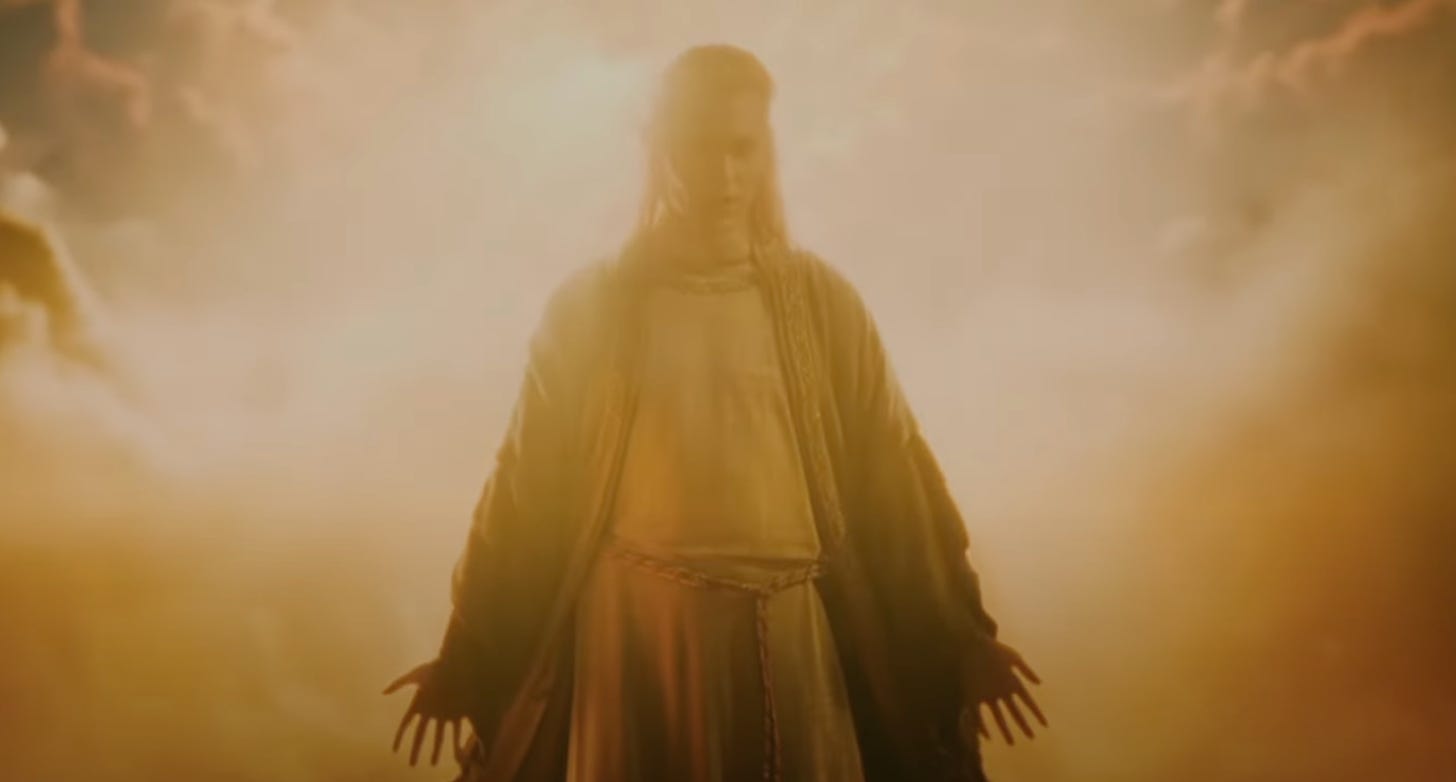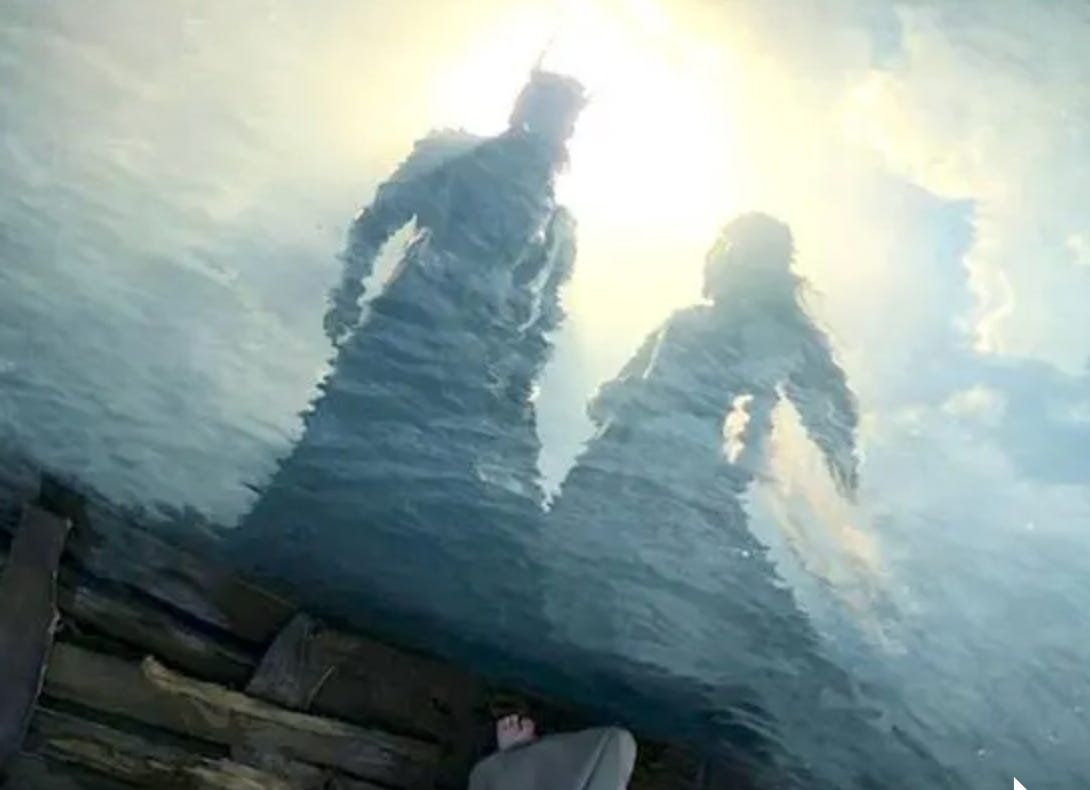Great Acting Cast: I Was Most Impressed so Far This Season by Morfydd Clark as the Unsure-of-Herself Mind-Violated Galadriel
The first half of the second season of The Rings of Power. Charlie Vickers, Charles Edwards, Sam Hazeldine, Owain Arthur, Sophia Nomvete, Robert Aramayo—even Benjamin Walker seems to have massively...
The first half of the second season of The Rings of Power. Charlie Vickers, Charles Edwards, Sam Hazeldine, Owain Arthur, Sophia Nomvete, Robert Aramayo—even Benjamin Walker seems to have massively stepped up the amount of his game he brings and that the directors and editors allow us to see—but most of all, IMHO, Morfydd Clark. Plus the entire design and audiovisual teams. If only they had had writers and showrunners able to deliver matching quality…
After the three-episode first-week release, I am ready to give Amazon’s Rings of Power a second chance.
I do not mind at all deviations of the story is told from those we find in the Red Book of Westmarch. How well did Bilbo Baggins know Elvish Quenya and Sindarin, anyway? How many of his sources in the library at Imladris involved special pleading by one elf-faction or another? How good a job at editing—and to what political purposes—did all the subsequent people who touched Bilbo’s drafts all the way down to Findegil in 172 F.A. do in the process of generating what we have as the textus receptus? We do know from other manuscripts that there were at least four different stories told about Galadriel’s status under the Ban of the Valar. That she was offered return, rejected it, and then was instrumental in Sauron’s Second-Age rise—that would be a story that only a very brave scribe in Fourth Age Gondor would dare to have publicized about the grandmother of the queen.
I thought the show did hit its stride and did a bang-up job with the final episode of season 1, which was carried by Charlie Vickers’s brilliant one-dollar and one-yard short temptation-seduction of Galadriel of the House of Finarfin to the Dark Side of the Force side of Morgoth. That it was almost successful is shown by her reaction fully four thousand years later to being confronted by Sauron’s Great Work:
You offer it to me freely... I do not deny that my heart has greatly desired this… In place of the Dark Lord, you would have a Queen, not dark, but beautiful and terrible as the Dawn. Treacherous as the Sea! Stronger than the foundations of the earth... All shall love me and despair!… (laughs) I pass the test. (laughs) I will diminish, and go into the West, and remain Galadriel… <https://assets.scriptslug.com/live/pdf/scripts/the-lord-of-the-rings-the-fellowship-of-the-ring-2001.pdf>
The series was still nearly collapsing under its weight of following too many narrative lines at once. But, that aside, it was well done. And I had hopes they would trim back the number of storylines as characters would join up. And the fact that they were no longer spending time playing hide-the-ball by trying to create “suspense” as to who and what kind of being crucial characters were would allow more actual story-telling.
Indeed, the first first three episodes of season 2—but again nearly collapsing under the weight of following too many narrative lines at once—kept up the pace.
The new Galadriel unsure of herself after her mind-violation by Sauron carries a great deal more heft than the old one—in any other show, Morfydd Clark would be the acting standout.
But Charlie Vickers continues to be brilliant with his successful temptation-seductions of Adar and of Celebrimbor—and Sam Hazeldine and Charles Edwards are equally brilliant in how they allow themselves to be tempted and seduced.
Plus the bonus round of Sauron’s backstory from the start of the Second Age to the moment he pulls Galadriel onto the raft, saying “The tides of fate are flowing. Yours may be heading in, or out...” was, on Jo Walton’s spearpoint theory, a decisive thrust.
Up to the closing episode 8, season 1 felt like Tolkien fanfic. from that season’s ultimate episode through season 2’s episode 3, it felt not like Tolkien but like the underlying stories that Tolkien was trying to adapt for us today.
But… but… but then came episode four.
And we have more characters!
We have another fallen Maia! We have barrow-wights! We have Ents! We have Tom Bombadil! And we have more diverging storylines as well!
I am no longer so hopeful about the back end of this season.
Ron Howard killed his version of Solo: A Star-Wars Story stone-dead by doing two things: first, abandoning the Guardians of the Galaxy vibe that the project had been greenlighted for and that the footage in the can when he took over resonated with, and making story subservient to fan-service by making every single minute explain something left puzzling in the original trilogy. Add in the showrunners’ unwillingess to prune back divergent storylines, and I fear we are headed for a second half of the season in which that force of nature that is story is drowned by disconnected subplots, which must then inevitably deliver us thin characters engaged in mediocre intrigues, simply because there is “just too much else to juggle” alongside the dynamic duos of Annatar and Celebrimbor, Adar and Galadriel, and Durin IV and Disa.
And yet, the last line of episode four almost redeems things. Adar to Galadriel: “Elen sila lumenn' omentielvo”—“a star shines on the hour of our meeting”.
References:
Baggins, Bilbo, Frodo Baggins, Samwise Gangee, & c. Findegil, ed. !72 F.A. The Red Book of Westmarch. Minas Tirith, Gondor: Great Library. <https://tolkiengateway.net/wiki/Red_Book_of_Westmarch>.
Gennifer Hutchison. 2024. “Script: Elven Kings Under the Sky. The Rings of Power. Season 2, Episode 1 Script. <https://transcripts.foreverdreaming.org/viewforum.php?f=1048>.
Gunn, James. Dir. 2014. Guardians of the Galaxy. Burbank: Marvel Studios. <https://www.themoviedb.org/movie/118340-guardians-of-the-galax>y
Howard, Ron. Dir. 2018. Solo: A Star Wars Story . Burbank: Walt Disney Productions. <https://www.disneyplus.com/movies/solo-a-star-wars-story/1jCZLztJzK0z>.
Russell, Bradley. 2024. “The Lord of the Rings: The Rings of Power Season 2 Review: A Bleak, Oppressive Ode to Middle-Earth Anchored by One of the Year's Best Performances”. GamesRadar+, September 5. <https://www.gamesradar.com/entertainment/lord-of-the-rings-tv-shows/the-lord-of-the-rings-the-rings-of-power-season-2-review/>.
Tolkien, J. R. R. 1954-5. The Lord of the Rings. London: Allen & Unwin. Accessed September 5, 2024. <https://archive.org/details/TheLordOfTheRings19541955Trilogy>.
Walsh, Fran, Philippa Boyens, & Peter Jackson. 2001. Script: The Fellowship of the Ring: Movie Script. Los Angeles: New Line Cinema. <https://assets.scriptslug.com/live/pdf/scripts/the-lord-of-the-rings-the-fellowship-of-the-ring-2001.pdf>.
Walton, Jo. 2004. “The Dyer of Lorbanery (Spearpoint Theory)”. Jo Walton's Blog. February 23. <http://www.jowaltonbooks.com/23rd-february-2004-the-dyer-of-lorbanery-spearpoint-theory/>.







The pacing feels way too fast, like the writers expect the audience to have no attention spans. TV for the tictoc era?
So Brad, As an economist, you should write a column on why there was no industrial revolution in Middle Earth. (Perhaps you could also estimate the Gini coefficient in Middle Earth.) Of course we all know Tolkien was sort of an eco freak. He deliberately made Sauron the bad guy, complete with pollution, inhumane working conditions etc. But every industrial society in the real world went through a Dickensian phase. So your thoughts on the subject would be interesting.